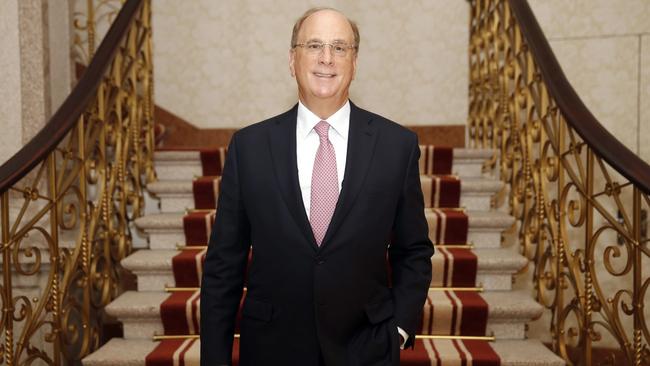Global carbon shock is coming: BlackRock’s Larry Fink
There is no company whose business model won’t be ‘profoundly affected by the transition to a net zero economy’.

The world’s largest fund manager BlackRock, has warned companies that fail to plan slashing carbon emissions to net zero face steep cuts in their valuations and being cut from its $US8.7 trillion ($11.3 trillion) investment pool as it ratchets up action on climate change including a vow to back proposals from green activists.
The US asset management giant headed up by Larry Fink said the “existential crisis” of Covid-19 has driven the world to also confront the threat of global warming with the focus switching from climate as an investment risk to targeting sustainable investments and holding companies to account over carbon pledges.
BlackRock plans to launch investment products with explicit temperature alignment goals, more forcefully use its votes on environmental shareholder proposals and called for a single global standard to pressure corporates to disclose how their business models will be compatible with a net zero economy.
“There is no company whose business model won’t be profoundly affected by the transition to a net zero economy – one that emits no more carbon dioxide than it removes from the atmosphere by 2050, the scientifically-established threshold necessary to keep global warming well below 2ºC,” Mr Fink wrote in his annual letter to major corporate bosses.
Companies “that are not quickly preparing themselves will see their businesses and valuations suffer, as these same stakeholders lose confidence that those companies can adapt their business models to the dramatic changes that are coming.”
Amid increasing pressure for investors and laggards like Australia to ratchet up their commitment to climate change and just days after Joe Biden reinstated the US to the Paris climate pact, Mr Fink said the reallocation of money to sustainable assets accelerated in 2020 more than expected given huge volatility from the pandemic.
“The consequences of the pandemic have been highly uneven. It sparked the most severe global economic contraction since the Great Depression and the sharpest fall off in equity markets since 1987. And although the stock market recovery bodes well for growth as the pandemic subsides, the current situation remains one of economic devastation, with unemployment severely elevated, small businesses shuttering daily, and families around the world struggling to pay rent and buy food,” Mr Fink said.
“I believe that the pandemic has presented such an existential crisis – such a stark reminder of our fragility – that it has driven us to confront the global threat of climate change more forcefully and to consider how, like the pandemic, it will alter our lives.”
“No issue ranks higher than climate change on our clients’ lists of priorities. They ask us about it nearly every day.”
Rapidly accelerating transition
Investors in mutual funds and exchange traded funds invested $US288bn globally in sustainable assets from January through November 2020, a 96 per cent increase over 2019.
“I believe that this is the beginning of a long but rapidly accelerating transition – one that will unfold over many years and reshape asset prices of every type. We know that climate risk is investment risk. But we also believe the climate transition presents a historic investment opportunity,” Mr Fink said.
A year after limiting its exposure to coal, BlackRock said investors were now demanding fund managers like BlackRock help them analyse the “most material climate-related risks that companies face, and how companies are managing them.”
BlackRock will incorporate climate considerations into its capital market assumptions and will establish a list of companies with heightened risk attached to global warming. The three criteria will be high carbon intensity, insufficient preparation for the move to net zero and a “low reception” when it engages with companies on green issues.
It will also become more active voting on shareholder proposals which could have a material impact among companies given it owns about 4 per cent of all the listed global equities.
“As a long-term investor, BlackRock has historically engaged to explain our views on an issue and given management ample time to address it. However, given the need for urgent action on many business-relevant sustainability issues, we will be more likely to support a shareholder proposal without waiting,” BlackRock said in a letter to clients.
BlackRock was one of the key institutional investors that urged Rio Tinto’s board to take stronger action against key executives over the destruction of heritage sites at Juukan Gorge, before a parliamentary inquiry into the affair this week found there were serious deficiencies in the miner’s culture, processes and systems.
In the past six months it has supported 8 environmental proposals, including at Australian blue chip companies BHP, AGL and Origin.
In 2021 BlackRock will expand its target climate universe from more than 440 to more than 1000 companies, which will include financial services companies — including banks — that finance emission generating projects.
Despite its strong stance on climate, the fund giant has come under the scrutiny of green groups who say it remains a major investor in coal companies due to a loophole in its policy. However, the US investor defended its strategy noting its active fund strategies include limits on the fossil fuel.
“BlackRock invests in different ways for different products. We’re a very large capital investor. We track the index and where they continue to contain things like coal companies we are obliged as a fiduciary to hold those companies,” Geraldine Buckingham, BlackRock’s chair for the Asia Pacific region told The Australian.








To join the conversation, please log in. Don't have an account? Register
Join the conversation, you are commenting as Logout